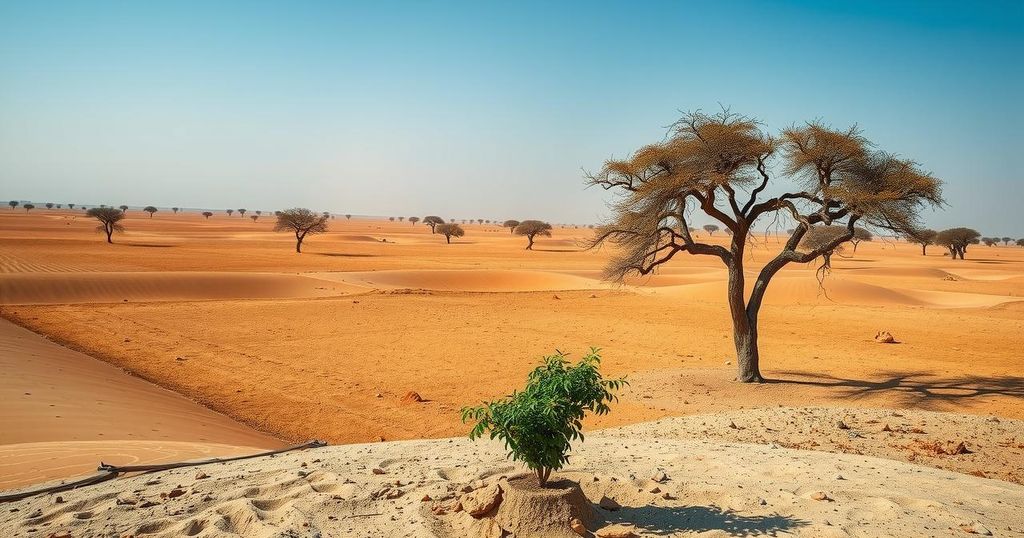Addressing Climate Change Challenges in the Politically-Isolated Sahel Region

The Sahel is currently experiencing severe flooding due to torrential rains, impacting millions and displacing many families. Political instability from military coups has further complicated the region’s climate adaptation efforts, limiting access to critical international support. Organizations emphasize the need for community empowerment through sustainable practices, yet ongoing governance challenges hinder progress in addressing climate vulnerabilities.
The Sahel region is grappling with significant climate change impacts, as this year’s torrential rains have led to flooding affecting millions, especially in Burkina Faso, Chad, Mali, Niger, Nigeria, and Sudan. The floods have displaced communities and devastated extensive areas of cropland. Political upheavals, including military coups in Burkina Faso, Mali, and Niger, have hindered governance and humidity adaptation initiatives, exacerbating the challenges faced by local communities in confronting severe weather conditions.
Organizations such as the Sahara and Sahel Observatory emphasize community empowerment through sustainable land and water management initiatives. This strategy includes establishing Water User Associations and adopting agroecology techniques to rely on local knowledge in enhancing resilience to climate impacts. However, ongoing political instability, poor governance, and inadequate funding are stalling progress, despite the Sahel’s capabilities for renewable energy and sustainable agriculture.
This year’s rainy season has brought unprecedented flooding, displacing families and impacting infrastructure. In Mali, the Niger River overflowed due to the heaviest rainfall recorded in over fifty years, leaving millions affected across West and Central Africa. Local leaders express concerns over health risks linked to contaminated water from the floodwaters, highlighting the urgent need for recovery strategies amidst increased difficulty in transportation and access.
The political landscape in the Sahel has complicated the adaptation to climate challenges, particularly after military coups that have led to international isolation from the West. This isolation limits access to vital climate finance, aggravating the vulnerabilities of communities already struggling under the weight of extreme weather events. Some neighboring nations with stable governance, such as Chad and Mauritania, have managed to incorporate coherent climate policies, albeit often driven by immediate security concerns rather than sustainable practices.
Sahelian countries with military governments face significant difficulties in securing resources while under sanctions that limit international financial assistance. This political climate has led to communities adapting independently through localized strategies, emphasizing sustainable farming and water management despite inadequate overall funding from national budgets devoted to climate adaptation.
Several regional organizations, such as the Sahara and Sahel Observatory, assist in bridging knowledge and financial gaps for climate adaptation. Their focus is on empowering communities to develop self-driven adaptation efforts rooted in local expertise. By establishing frameworks like Water User Associations, local governance and community members collaborate to ensure sustainable management of water resources that are paramount in this water-scarce region.
Despite the focus on local adaptation, political instability continues to obstruct effective climate action in the Sahel. Governance weaknesses often delay project implementations and disrupt international aid. The lack of substantial engagement from international donors causes significant barriers to establishing essential environmental interventions needed for long-term resilience.
There is potential for improving energy access through regional ties like the West African Power Pool, allowing for cleaner energy solutions. Chad could harness its solar resources, enhancing both local and regional energy security while fighting climate change. However, this vision requires overcoming substantial governance and infrastructure challenges that persist under the current political circumstances.
Many local adaptation strategies center on agroecology while NGOs and developmental agencies are crucial in fostering community participation. These collaborative efforts can promote resilience even amidst political barriers, and international financial institutions are encouraged to explore innovative financing methods compatible with local needs. Experts advocate for a holistic approach, combining various innovative strategies to address interconnected challenges posed by climate change and political instability.
In summary, the Sahel is facing a critical intersection of climate change impacts and political instability, complicating effective adaptation efforts. The region’s communities are experiencing severe flooding and have limited access to international climate finance due to political isolation following military coups. Efforts by local organizations and community-driven adaptation strategies are essential for resilience, but they face significant challenges due to governance issues and funding gaps. Enhanced regional cooperation and the establishment of robust governance frameworks are necessary for effective climate action and sustainability in the Sahel.
Original Source: news.mongabay.com






